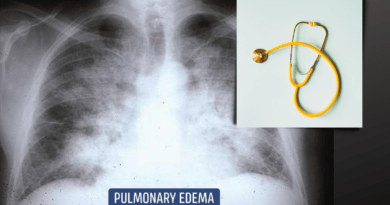Informative: Know The Hidden Dangers Of Self-Medication
Self-medication, however, can have unexpected negative effects and possibly pose major health risks. Because they think they can handle minor symptoms like a cold or sore throat on their own, many people take medications without first seeing a doctor.
Experts concur that this method frequently relies on dubious information found online.
Without a thorough diagnosis, taking medication may cause more harm than benefit. When treating viral diseases, for instance, people frequently take antibiotics by themselves without knowing that improper dosage can result in drug resistance.
If taken improperly, even simple drugs like cough syrups, decongestants, and paracetamol can have serious negative effects. For example, using decongestants excessively may cause atrophic rhinitis, a disorder that damages the nose’s inner lining. Overdosing on paracetamol can be hazardous and damage the liver.
According to researchers, in developing nations like India and Nepal, self-medication and non-doctor prescription drug use are widespread.
According to a study that was published in the peer-reviewed journal BMJ Primary Care, residents of Nepal’s Pokhara Valley consumed drugs—particularly antibiotics—without the recommended dosage. “Education to help patients decide on the appropriateness of self-medication is required,” the study said.
Even in India, the researchers noted, chemists and their helpers frequently promote self-medication. A lot of people utilise tonics or food supplements that might not actually help, as well as combination medications that include concealed chemicals.
The Reasons for Consulting a Physician for an Appropriate Diagnosis
It is essential to speak with a doctor before taking medication since they evaluate a patient’s medical history and recommend the best course of action.

Medical Superintendent,
Pushpawati Singhania Hospital and Research Centre, New Delhi
“You shouldn’t rely on medication at all without consulting a doctor unless the fever persists for more than two days,” said Dr Kulvinder Singh Kochhar, Medical Superintendent, Pushpawati Singhania Hospital and Research Centre, New Delhi, emphasising the value of expert medical guidance.
In addition to common infections like dengue, typhoid, or malaria, there are hundreds of other causes of fever. “After a lengthy journey, a person may occasionally get a fever brought on by exhaustion. Self-medication in these situations can have long-term negative effects on the body,” Dr Kochhar continued.
In particular, you should never use antibiotics without a prescription. Incomplete use of antibiotics can lead to antibiotic resistance; thus, it’s crucial to finish the entire course if a doctor prescribes them rather than stopping in the middle.
The risks associated with excessive use of painkillers and fever medications
Assuming paracetamol is safe, many individuals take medication to treat pain and fever. Dr Kochhar expressed that even paracetamol, considered one of the safest medications, can be harmful in excess.
“The liver metabolises paracetamol, even though it may be harmless for the kidneys if taken in excess. Without the right advice, excessive use can injure the liver and ultimately cause poisoning, which can lead to liver failure, Dr Kochhar added.
Additionally, self-medication might lead to dependency. “While still experiencing physical aches, people may take a pain reliever in anticipation of a fever. In order to let the discomfort go away on its own, people should rest and drink plenty of water during this time,” Dr Kochhar continued.
600 older persons from six Indian cities participated in a cross-sectional study that revealed a high prevalence of polypharmacy, or taking five or more prescriptions daily, and self-medication.
Medication practices among senior citizens in New Delhi, Chennai, Kolkata, Ujjain, Patna, and Guwahati were investigated by researchers from the Karolinska Institute in Stockholm as well as a number of Indian medical facilities.
According to the study, 33.7% of senior citizens engaged in polypharmacy.
- Ujjain had the lowest rate (11.7%), while Guwahati had the highest (57%).
- Antihypertensives, antidiabetics, hypolipidemics (drugs that lower cholesterol), calcium supplements, and nonsteroidal anti-inflammatory medicines (NSAIDs) were the most often prescribed medications.
- Of the participants, 25.2% used fixed-drug combinations, frequently without being aware of the hazards.
- The survey also showed that about 20% of participants used self-medication, particularly those who were single or had several medical issues.
Why Is Self-Mediation So Important To Indians?
Indians’ practice of self-medication extends well beyond the simple availability of over-the-counter medications. The fixation actually stems from a number of factors, such as a general mistrust of the medical system, cultural beliefs, and financial limitations.
Because of worries about overprescribing, malpractice, and the perception that pharmaceutical corporations are motivated by profit, there is a great deal of mistrust in the medical system. People consequently turn to conventional treatments, elder guidance, or even pharmacists who serve as unofficial medical professionals,” Dr Kochhar told WFY.
Concerns about money are also quite important. Because they believe that doctor visits are costly, many people steer clear of them. Using the internet or guidance from social media influencers, some people decide to diagnose themselves, which might result in inaccurate information and inappropriate therapy.
According to Dr Kochhar, stigma has a significant role in mental health. People frequently self-diagnose based on the experiences of others and take drugs without sufficient consultation instead of seeking professional advice.
Beyond this, social media and self-described health experts have become much more influential.
Numerous influencers, some of whom are not medical professionals, convey knowledge in a way that appeals to the general audience.
People are beginning to trust these sources more than competent specialists because of sensationalised information, a lack of medical knowledge, and overworked doctors who do not always have time to fully explain issues.
According to Dr Kochhar, “this is particularly evident in mental health conditions like ADHD”, a neurodevelopmental disorder that affects daily living and frequently begins in childhood and is marked by persistent symptoms of inattention, hyperactivity, and impulsivity.
“Many people misdiagnose themselves based on online information and visit clinics demanding specific medications,” said Dr Kochhar.
Common Medication Misuse And The Risks
The most often abused medications include blood pressure and diabetic medications, opioids, antacids, anti-allergic medications, paracetamol, and other fever medications.
“It is not advisable for many individuals to take their medications at home before seeing a doctor. For instance, a person may take blood pressure medication after observing one elevated reading without recognising that stress or worry may be the cause. Antibiotics intended to treat bacterial infections are also frequently overused to treat viral infections, according to Dr Kochhar.
In order to highlight the risks of self-medication, Dr Kochhar gave examples from real-world situations. For example, one of his patients tested his blood sugar at home, thought it was high, and took diabetes medicine without first talking to his doctor. “This led to dangerously low sugar levels, causing dizziness and weakness,” he stated.
Another patient took an antibiotic for stomach infections while experiencing a five-day fever and sore throat. According to him, this resulted in side symptoms like lightheadedness, acidity, constipation, and diarrhoea—a classic example of antibiotic resistance.
A Rising Issue With Antibiotic Resistance
Antibiotic resistance is one of the main risks associated with self-medication. Antibiotics are often taken without a prescription, which reduces their effectiveness when they are truly needed.
Ignorance and ignorance, as well as a lack of knowledge, were the main causes of the silent epidemic. Many Indians are unaware of the distinction between antibiotics and antiviral drugs, despite the fact that most people believe that antibiotics are more potent and effective when they are sick.
Antibiotics fight bacterial infections like tuberculosis, whereas antiviral medications counteract the symptoms of viral infections like COVID-19, the common cold, flu, and HIV. They are ineffective against viruses.
“I often see patients who have been on antibiotics for 5–7 days, and when we perform blood and urine cultures, we find that many antibiotics no longer work for them,” Dr Kochhar said.
This results in the terrible problem of antibiotic resistance, when the body no longer reacts to antibiotics, particularly when it is infected with harmful germs. The healthcare system is overworked as a result, which results in longer hospital stays, more expensive prescription drugs, and longer treatment periods.
The hazards of self-medication, including misdiagnosis and hazardous drug reactions, were highlighted in advice published by the Directorate of Health Services in 2024.
The phrase “Say ‘No to antibiotics without prescription'” embodied the advisory’s strong recommendation against using antibiotics without a prescription.
How To Use Medications Safely
When using medications, care must be taken. A doctor’s advice could assist you in comprehending the medication you’re taking for which symptoms in order to prevent health dangers.
“Always get medical advice before using any drug to prevent health dangers. Consider getting a consultation online if you are unable to see a doctor in person. Antibiotics, acidity treatments, painkillers, and other medications should never be taken without competent supervision. According to Dr Kochhar, “they may cause serious health problems that can harm your body silently over time.”
For common illnesses, self-medication may seem like a quick remedy, but there are serious hazards involved.
The next time you feel ill, keep in mind that seeing a doctor is always safer than figuring out what medication to take on your own. You can’t risk your health too much.




